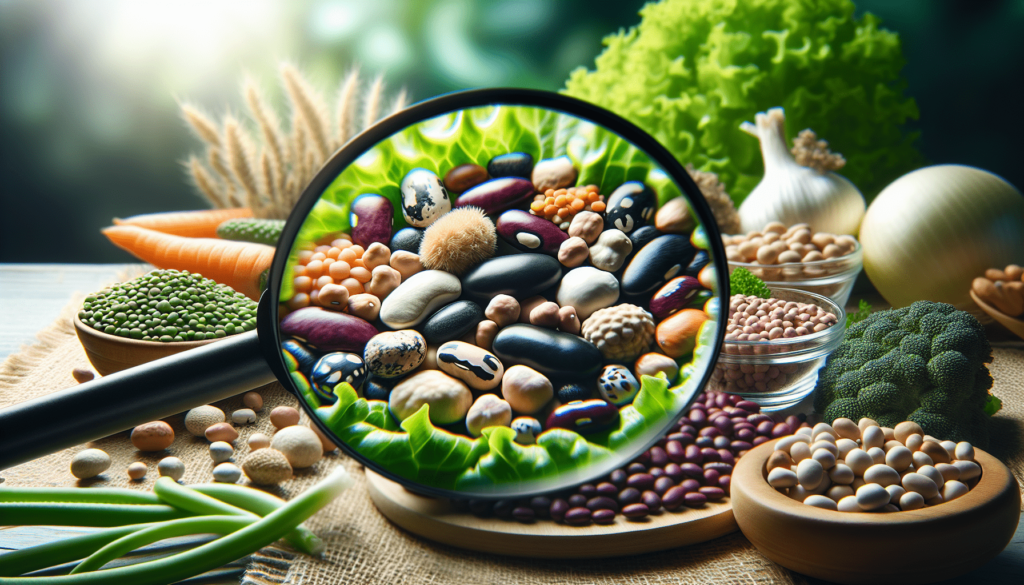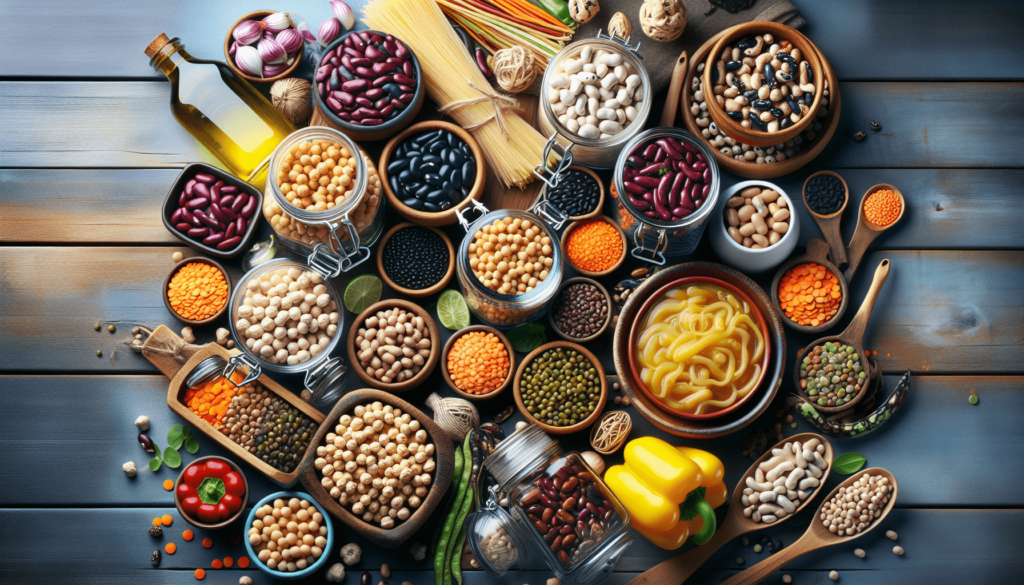Whether you’re a dedicated vegetarian or vegan, or simply looking to incorporate more plant-based protein into your diet, beans are an excellent choice. Not only are they versatile and delicious, but they also offer a wide range of health benefits. From providing essential nutrients to helping maintain a healthy weight, beans can be a valuable addition to your meat-free meals. In this article, we will explore the specific types of beans that are particularly beneficial for vegetarian and vegan diets, helping you make informed choices when it comes to your plant-based nutrition.

Introduction
Beans are a versatile and nutritious food that can be a valuable addition to any vegetarian or vegan diet. Not only are they packed with essential nutrients, but they also offer a variety of health benefits. Whether you’re looking for a plant-based source of protein, a high-fiber option, or a nutrient-rich carbohydrate, beans have got you covered. In this article, we will explore the nutritional benefits of beans, discuss different types of beans, highlight protein-rich and fiber-rich options, delve into the carbohydrate content in beans, explore the vitamins and minerals they contain, and examine the specific benefits of beans for vegetarian and vegan diets. We will also provide tips on how to incorporate beans into your meals and offer some delicious bean-based recipes. So let’s dive in and discover the many reasons why beans should be a staple in your vegetarian or vegan diet.
Nutritional Benefits of Beans
Protein
Protein is an essential nutrient for maintaining and repairing tissues in the body, and it is especially important for those following vegetarian or vegan diets. Beans are an excellent plant-based source of protein, making them a valuable addition to meals. Soybeans, black beans, and chickpeas are particularly high in protein, with soybeans being one of the few plant-based proteins that contains all the essential amino acids. Adding these protein-rich beans to your diet can help ensure that you are meeting your daily protein needs.
Fiber
Fiber is another important component of a healthy diet, and beans are an excellent source of this nutrient. Fiber plays a crucial role in maintaining digestive health, regulating blood sugar levels, and promoting feelings of fullness. Lentils, kidney beans, black beans, and pinto beans are all rich in fiber, making them perfect choices for incorporating into vegetarian and vegan diets. Consuming fiber-rich beans can help support a healthy digestive system and aid in weight management.
Carbohydrates
Carbohydrates are the body’s primary source of energy, and beans provide a nutritious and sustainable source of this macronutrient. While some beans are considered low-carb options, others have a more moderate carbohydrate content. Black beans and lentils are examples of low-carb beans, making them suitable for those looking for a lower-carbohydrate option. On the other hand, kidney beans, navy beans, and pinto beans contain a more moderate amount of carbohydrates. Including these carbohydrate-rich beans in your diet can help provide the energy you need to fuel your active lifestyle.
Vitamins and Minerals
Beans are not only rich in protein, fiber, and carbohydrates, but they also contain a wide range of vitamins and minerals. Some of the key nutrients found in beans include iron, calcium, folate, magnesium, potassium, and zinc. These essential vitamins and minerals play vital roles in various bodily functions, such as bone health, immune system support, and energy production. Incorporating a variety of beans into your vegetarian or vegan diet can help ensure you are getting a well-rounded intake of these important nutrients.
Types of Beans
Now that we understand the nutritional benefits of beans, let’s explore the different types of beans available and their unique characteristics.
Black Beans
Black beans are a versatile legume known for their dark color and rich flavor. They are an excellent source of protein and fiber, making them a nutritious addition to any meal. Black beans are commonly used in Latin American and Caribbean cuisine, but they can also be incorporated into a wide range of dishes, such as soups, salads, and even brownies. Their hearty texture and earthy taste make them a popular choice for both vegetarian and vegan diets.
Chickpeas
Chickpeas, also known as garbanzo beans, are a staple in Mediterranean and Middle Eastern cuisines. They are high in protein and fiber, making them an ideal choice for vegetarian and vegan diets. Chickpeas can be used in a variety of dishes, including hummus, salads, stews, and even desserts like chocolate chip chickpea cookies. With their nutty flavor and creamy texture, chickpeas are a versatile bean that can be enjoyed in countless ways.
Lentils
Lentils come in various colors, including green, brown, red, and black, and each variety offers its own unique taste and texture. They are an excellent source of protein and fiber, making them a popular choice for vegetarian and vegan diets. Lentils cook relatively quickly compared to other beans, making them a convenient option for busy individuals. They can be added to soups, stews, salads, or used as a meat alternative in dishes like lentil tacos or lentil burgers.
Kidney Beans
Kidney beans are large, kidney-shaped legumes that are commonly used in chili recipes. They are a good source of protein and fiber, making them a nutritious addition to vegetarian and vegan meals. Kidney beans have a rich, meaty texture and absorb flavors well, making them an excellent choice for hearty dishes like bean chili, bean burgers, or bean-based stews. With their vibrant color and robust flavor, kidney beans add a satisfying element to any meal.
Navy Beans
Navy beans, also known as white beans, are small, oval-shaped legumes. They have a mild, creamy flavor and a delicate texture that makes them a versatile addition to various dishes. Navy beans are commonly used in baked beans, soups, and stews. They are also the main ingredient in classic comfort foods like navy bean soup and New England-style baked beans. With their subtle taste and ability to absorb flavors, navy beans can be incorporated into a variety of vegetarian and vegan recipes.
Pinto Beans
Pinto beans are large, speckled beans with a creamy texture and a slightly nutty taste. They are a good source of protein and fiber, making them a nutritious option for vegetarian and vegan diets. Pinto beans are commonly used in Mexican and Tex-Mex cuisine, where they are often mashed and seasoned to make refried beans. They can also be used in soups, stews, and chili recipes. With their unique flavor and versatility, pinto beans are a popular choice for flavorful and satisfying meals.
Soybeans
Soybeans are a complete source of protein, meaning they contain all the essential amino acids the body needs. They are highly versatile and can be used to create a wide variety of soy-based products, such as tofu, tempeh, soy milk, and soy protein isolates. Soybeans can also be cooked and used as a standalone protein source in dishes like stir-fries or salads. With their high protein content and adaptability, soybeans are an excellent option for vegetarian and vegan diets.

Protein-rich Beans for Vegetarian and Vegan Diets
Protein is a crucial nutrient for those following vegetarian and vegan diets, as it plays a vital role in supporting overall health and well-being. While plants can provide protein, not all sources are equally rich in this essential nutrient. Luckily, there are several types of beans that are particularly high in protein, making them perfect choices for vegetarians and vegans.
Soybeans
Soybeans are one of the best plant-based sources of protein, as they contain all the essential amino acids the body needs. They are incredibly versatile and can be used to create a wide range of soy-based products, including tofu, tempeh, and soy milk. Whole cooked soybeans are also an excellent protein source and can be added to various dishes or used as the main protein component in vegetarian or vegan meals.
Black Beans
Black beans are not only delicious but also packed with protein. They offer approximately 15 grams of protein per cooked cup. This makes them a valuable addition to vegetarian and vegan diets, providing a substantial amount of protein to support muscle growth and repair.
Chickpeas
Chickpeas are another protein-rich bean that is commonly used in vegetarian and vegan cooking. They offer approximately 15 grams of protein per cooked cup, making them an excellent choice for those looking to meet their daily protein needs. Chickpeas can be used in a variety of dishes, including hummus, salads, curries, and soups, allowing for endless possibilities in the kitchen.
Fiber-rich Beans for Vegetarian and Vegan Diets
Fiber is an essential nutrient that aids in maintaining a healthy digestive system and promoting feelings of fullness. It is especially important for vegetarian and vegan diets since plant-based foods are generally high in fiber. When it comes to beans, there are several options that stand out in terms of their fiber content.
Lentils
Lentils are rich in both protein and fiber, making them an excellent choice for vegetarian and vegan diets. They offer approximately 15 grams of fiber per cooked cup, which is a substantial amount compared to many other foods. Lentils can be used in a variety of dishes, such as soups, stews, salads, and even as a meat substitute in dishes like lentil-based burgers or tacos.
Kidney Beans
Kidney beans are not only a good source of protein but also a fiber-rich option for vegetarian and vegan diets. They offer approximately 13 grams of fiber per cooked cup. Kidney beans are commonly used in chili recipes, but they can also be added to soups, stews, and casseroles, providing a boost of fiber to your meals.
Black Beans
Black beans are not only protein-rich but also an excellent source of fiber. They offer approximately 15 grams of fiber per cooked cup, which is about half of the recommended daily intake for adults. Black beans can be incorporated into a variety of dishes, including salads, burritos, enchiladas, and even desserts like black bean brownies.
Pinto Beans
Pinto beans are another fiber-rich option for vegetarian and vegan diets. They offer approximately 15 grams of fiber per cooked cup, providing a substantial amount of this nutrient. Pinto beans are commonly used in Mexican cuisine, where they are often mashed and seasoned to make refried beans. They can also be added to soups, stews, and chili recipes, boosting the fiber content of these dishes.
Carbohydrate Content in Beans
Carbohydrates are the body’s primary source of energy, making them an essential component of any diet. While some individuals may opt for low-carbohydrate diets, carbohydrates should still be included in adequate amounts to support overall health and vitality. When it comes to beans, there are options available for both low-carb and moderate-carb diets.
Low-carb Beans
If you are following a low-carb diet or simply prefer lower-carbohydrate options, there are beans that fit into this category. Black beans and lentils are examples of low-carb beans, each offering approximately 20 grams of carbohydrates per cooked cup. These beans can be enjoyed in moderation for those looking to reduce their carbohydrate intake while still enjoying the benefits of beans.
Moderate-carb Beans
While some individuals may prefer lower-carbohydrate options, others may require a more moderate carbohydrate intake to support their energy needs. Kidney beans, navy beans, and pinto beans fall into this category, providing approximately 40-45 grams of carbohydrates per cooked cup. These beans can be included in meals and recipes to provide a sustained and nutritious source of energy for active individuals.
Vitamins and Minerals in Beans
In addition to being a good source of protein, fiber, and carbohydrates, beans also contain a variety of essential vitamins and minerals. Let’s explore some of the key nutrients found in beans and their benefits for vegetarian and vegan diets.
Iron
Iron is a crucial mineral involved in the production of red blood cells and carrying oxygen throughout the body. Vegetarians and vegans may be at a higher risk of iron deficiency since plant-based sources of iron are not as easily absorbed by the body as animal-based sources. Beans, particularly kidney beans and black beans, are excellent sources of iron, providing a substantial amount of this essential mineral.
Calcium
Calcium is a vital mineral for maintaining bone health and supporting various bodily functions. While dairy products are often relied upon as a source of calcium, beans also offer a good amount of this nutrient. Navy beans and soybeans are especially noteworthy for their calcium content, making them beneficial for those following vegetarian or vegan diets.
Folate
Folate, also known as vitamin B9, plays a crucial role in DNA synthesis and the formation of new cells. Lentils and chickpeas are excellent sources of folate, providing a significant portion of the recommended daily intake. Incorporating these beans into your vegetarian or vegan diet can help ensure you are meeting your folate needs and supporting overall health.
Magnesium
Magnesium is involved in numerous biochemical reactions in the body and is essential for maintaining bone health, regulating blood pressure, and supporting muscle and nerve function. Kidney beans and black beans are excellent sources of magnesium, providing a substantial amount of this mineral to support overall health and well-being.
Potassium
Potassium is an electrolyte that plays a crucial role in maintaining proper heart and muscle function, as well as regulating fluid balance in the body. Navy beans and soybeans are rich in potassium, making them valuable additions to vegetarian and vegan diets.
Zinc
Zinc is an essential mineral for immune system function, wound healing, and DNA synthesis. Kidney beans and chickpeas are notable sources of zinc, providing a substantial amount of this mineral to support optimal health.
Incorporating a variety of beans into your vegetarian or vegan diet can help ensure you are getting a well-rounded intake of these essential vitamins and minerals, supporting overall health and well-being.
Benefits of Beans for Vegetarian and Vegan Diets
Adequate Protein Source
One of the main concerns for individuals following vegetarian or vegan diets is ensuring they are consuming adequate amounts of protein. Beans are a valuable source of plant-based protein, offering a wide range of amino acids necessary for various bodily functions. Incorporating protein-rich beans like soybeans, black beans, and chickpeas into your meals can help meet your daily protein requirements and support muscle growth and repair.
Satiety and Weight Management
Fiber plays a crucial role in promoting feelings of fullness and maintaining a healthy weight. Since beans are high in both protein and fiber, they can help keep you satisfied and may aid in weight management. Including fiber-rich beans like lentils, kidney beans, black beans, and pinto beans in your vegetarian or vegan meals can help support a healthy appetite and prevent overeating.
Digestive Health
A healthy digestive system is essential for overall well-being, and beans can play a significant role in supporting digestive health. The high fiber content in beans helps promote regular bowel movements and prevent constipation. Additionally, beans contain natural compounds called prebiotics, which provide fuel for beneficial gut bacteria, supporting a healthy gut microbiome.
Reduced Heart Disease Risk
Heart disease is a leading cause of death worldwide, and certain dietary factors can influence its development. Consuming beans regularly has been linked to a reduced risk of heart disease. Beans are low in saturated fat and cholesterol and contain heart-healthy nutrients like fiber, potassium, and magnesium. Including beans in your vegetarian or vegan diet can help support heart health and reduce the risk of cardiovascular complications.
Improved Blood Sugar Control
Maintaining stable blood sugar levels is crucial, particularly for individuals with diabetes or those at risk of developing diabetes. The fiber and complex carbohydrates found in beans help slow down the digestion and absorption of carbohydrates, preventing rapid spikes in blood sugar levels. This can contribute to improved blood sugar control and long-term health outcomes.
Incorporating Beans into Vegetarian and Vegan Diets
Now that we understand the nutritional benefits of beans and their positive impact on vegetarian and vegan diets, let’s explore some practical ways to incorporate beans into your meals.
Bean-based Recipes
There are countless delicious bean-based recipes out there that can add variety and flavor to your vegetarian or vegan diet. From classic dishes like bean chili, lentil soup, and black bean burgers to more creative options like chickpea curry or soybean stir-fry, the possibilities are endless. Get creative in the kitchen and experiment with different flavor combinations and cooking techniques to enjoy the full range of tasty bean-based dishes.
Snacks and Side Dishes
Beans can also be incorporated into snacks and side dishes to add a nutritional boost to any meal. Hummus, made from chickpeas, is a perfect dip for fresh vegetables or pita bread. Roasted chickpeas make a delicious crunchy snack, and black bean salsa or kidney bean salad can be enjoyed as a refreshing side dish. The versatility of beans allows you to add them to almost any meal to increase its nutritional value.
Bean Substitutes
Beans can also act as substitutes for other ingredients in vegetarian or vegan recipes. For example, mashed black beans can be used as a meat substitute in burgers or tacos, while lentils can replace ground meat in dishes like spaghetti Bolognese. Beans provide a great alternative to animal-based proteins and add a unique texture and flavor to any dish.
Conclusion
Beans are a nutritious and versatile addition to vegetarian and vegan diets. They are rich in protein, fiber, carbohydrates, vitamins, and minerals, making them a valuable source of essential nutrients. Including a variety of beans in your meals can help meet your daily protein needs, support a healthy digestive system, aid in weight management, reduce the risk of heart disease, and improve blood sugar control. Whether you choose soybeans, black beans, chickpeas, lentils, kidney beans, navy beans, or pinto beans, each type offers its own unique nutritional profile and can be incorporated into a wide range of delicious recipes. So why not embrace the benefits of beans and make them a staple in your vegetarian or vegan diet? Your health and taste buds will thank you!
